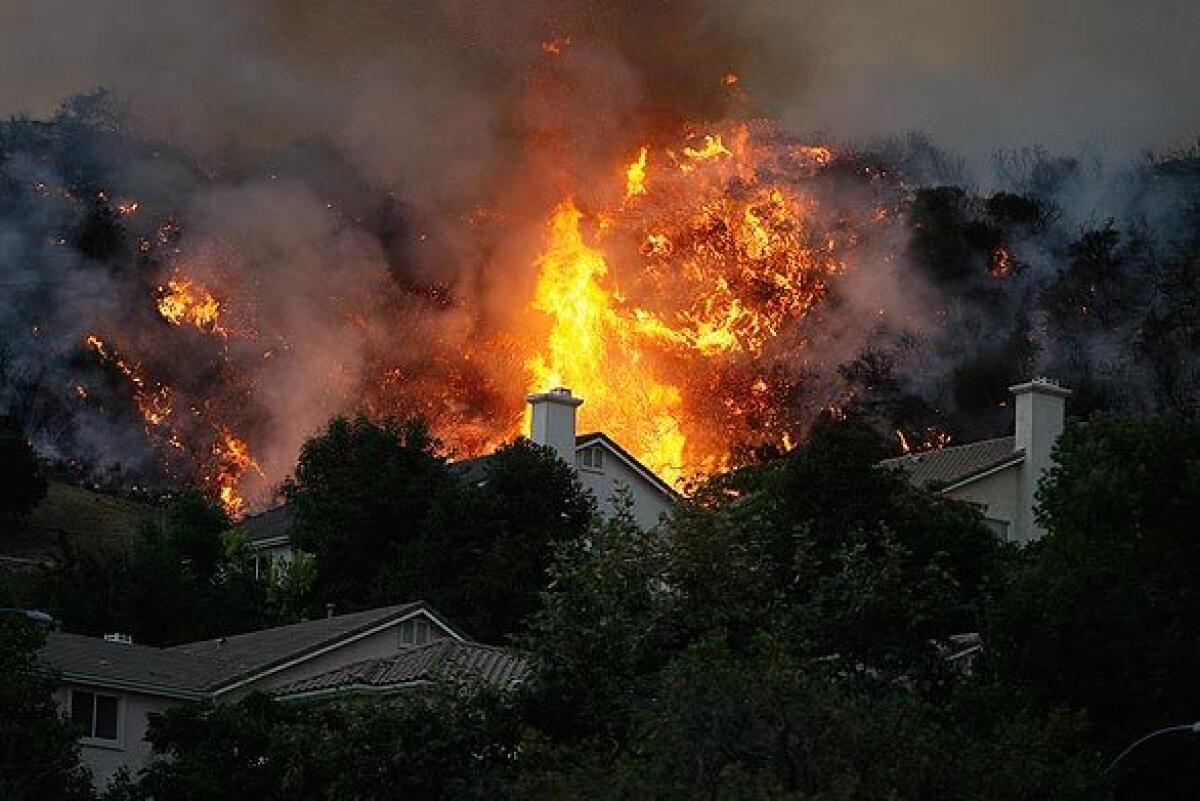Federal inspector general launches probe of Station fire

- Share via
A federal inspector general has launched an investigation and the Obama administration has invited Congress to order a broad inquiry into last summer’s disastrous Station fire after learning that dispatch recordings had been withheld from a U.S. Forest Service review team.
The telephone recordings, from the critical early hours of the blaze, also were withheld from The Times, which requested them under the Freedom of Information Act.
The inspector general’s probe will focus on why the several days of recordings were not provided to The Times or turned over to the Forest Service inquiry, which concluded that the agency’s initial attack on the fire was proper.
“I find this very serious,” Forest Service Chief Tom Tidwell said Tuesday. “I’m very concerned and troubled that this was not found earlier.... We want to get this information to learn what occurred on the Station fire.”
Tidwell said Agriculture Secretary Tom Vilsack, whose department runs the Forest Service, invited Congress to request the fuller investigation of the agency’s handling of the fire in the Angeles National Forest, a probe that would be conducted by the Government Accountability Office.
The content of the withheld recordings is not known. Tidwell said officials were still transcribing them and the results would be released in coming days.
He said the recordings were found after he ordered a reexamination of all records on the fire and the agency’s response to The Times’ requests for copies of audio dispatch communications, a number of which have been released.
The news organization also had raised questions about an erroneous entry in a key transcript, which Forest Service officials blamed on a private contractor.
A Forest Service spokesman said the Agriculture Department’s inspector general could recommend criminal charges based on what the investigation finds.
No Forest Service employee has been fired or placed on leave since the recordings were unearthed, Tidwell said.
He said he wanted the reexamination completed before a panel of local members of Congress convened by Rep. Adam Schiff (D-Burbank) holds a public meeting on the Station fire next Tuesday in Pasadena. Schiff scheduled the session after The Times reported that the Forest Service had misjudged the threat posed by the fire, scaled back the initial attack and failed to fill crucial orders for air tankers on the second morning.
The Station blaze, which broke out Aug. 26, blackened 250 square miles of the forest, destroyed scores of homes and other structures, and killed two Los Angeles County firefighters. It was the largest fire in county history.
In a statement Tuesday, Schiff said he was “concerned with the late discovery of these recorded conversations.” He also said that the phone calls, unlike radio transmissions, “appear to have been recorded without the knowledge or consent of some or all of the parties.”
Tidwell said he was not aware of the recordings when he told a Senate subcommittee in May that the Forest Service had deployed the earliest available air tankers on the second morning, when the blaze covered just a few acres.
According to federal records and state officials, other tankers were available sooner, but the Forest Service failed to complete an order for them made by its own commander on the ground.
Dispatch records show that a Forest Service officer again asked for tankers about 7 a.m. Aug. 27, six hours after the initial request. Three Forest Service tankers were subsequently deployed, but did not reach the fire until after it began racing through the forest.
Most of the questions about how the fire became so destructive have focused on the absence of a fierce air attack in the hours after dawn on Day 2, as well as a decision the previous evening to reduce the number of ground crews. The flames had been nearly contained, in part because of a sustained pounding by helicopters and planes. After the aircraft returned to base at nightfall, the fire began to gather strength.
Officials said in September that they had believed enough aircraft were deployed early on Day 2. In the review conducted by the Forest Service, the agency concluded that aerial dumps during the hours after first light would have been ineffective because the blaze was burning in a canyon too steep for ground crews to safely finish extinguishing the flames.
After that finding was disputed by firefighters at the scene as well as by the Forest Service’s own records, officials told The Times and the Senate panel that the tankers were not sent sooner because of a shortage of rested pilots and relief aircraft.
Records and interviews later showed that state tankers were available.
In one transcript of a previously released radio transmission, the word “tankers” had been replaced with “unintelligible,” even though “tankers” was clearly audible on the recording. The word “push,” which could refer to a tanker order, was erroneously inserted. The Forest Service blamed the errors on a private contractor. The contractor did not respond to Times questions, and officials said the firm has since declined to work with the Forest Service.
More to Read
Sign up for Essential California
The most important California stories and recommendations in your inbox every morning.
You may occasionally receive promotional content from the Los Angeles Times.











